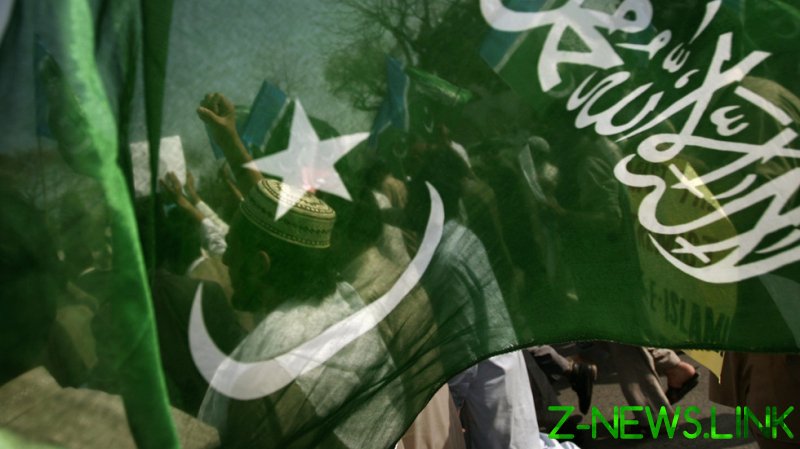
Pakistan’s traditionally complex and intricate domestic political environment has just experienced another reshuffling. With the government headed by Imran Khan determined to salvage its position, even by dissolving the National Assembly (the lower chamber of the parliament), the joint opposition led by Shehbaz Sharif proved its resolve to oust the prime minister by appealing to the Supreme Court. Meanwhile, another powerful un-elected institution – the army – waited in the wings to come on stage.
However, the play’s outcome turned out to be less dramatic than some may have expected: parliamentarism, at the time empowered by the Supreme Court’s interpretation of constitutionalism, prevailed over the controversial ‘doctrine of necessity.’ The reconvened National Assembly eventually voted in favor of the no-confidence motion that ended up forcing Khan from his post.
This could have been just another story of ‘how Pakistani civilian rulers can lose power’ if one did not come to notice the presence of Russia in the room.
What does ‘Aazadi’ mean?
“We are not a nation to be used as a tissue paper. We do not want a one-sided relationship with anyone. When European Union ambassadors gave a statement against protocol asking Pakistan to condemn Russia … can they say that in India? Do they have the courage? “ – said the former prime minister during his address to the nation on April 8.

This time, Imran Khan had to accept the fact that he had lost the support of both the political class – the wide range of opposition parties along with dissidents from his own coalition; and the establishment – the military, judiciary, civilian bureaucracy, ulema (Muslim clergy), business circles and landowners. However, the ousted national leader invoked a trump card that is certain to play its role in the future: the allegation of foreign conspiracy.
Both the country’s power elite and its population at large have always realized that the idea of the ‘Muslim Nation’ – which is part of the two-nation theory that predetermined the Partition of British India – is a rather fragile construct. After gaining independence from the British in 1947, Pakistan has survived several bloody conflicts with India over Kashmir and other disputed territories, the secession of East Pakistan, innumerable insurgencies in Balochistan, Khyber Pakhtunkhwa and Sindh. However, within the national meta-narrative all of those misfortunes have historically been attributed to foreign interference aimed at undermining Pakistani ‘aazadi’ – an important national concept that in the Urdu language means ‘freedom’ or ‘independence’ – and thus ultimately destroying the nation.
In Pakistani discourse, India is undoubtedly seen as ranking first among states that seek to “eliminate even the idea of the existence of the Muslim Nation.” Hence, the idea of full preparedness to deter what are perceived as “India’s aggressive policies,” counter its “covert intrigues” and uncover “insidious conspiracies” organized by Indian security agencies is inherent in Pakistani society. Not giving this sufficient attention is seen to be endangering aazadi and statehood itself.
Nevertheless, India is not alone in the interference ranking and is joined by an unsurprising character: the United States. Pakistan’s ties with Washington are ambiguous and have seen many ups and downs, but the two nations still appear to be indispensable to each other. It is therefore no wonder that it was the US that first voiced concern and objections in the wake of Khan’s visit to Moscow on February 23-24.
Strategic partnership vs giving up to the infidel
At the dawn of the Cold War, US strategists seem to have taken rather reasonable steps by compelling Pakistan to join American initiatives in constructing a regional security architecture. The goal was to contain Soviet expansion in Asia. Back then, Pakistan had no choice but to align with a superpower to enhance its defense capabilities – otherwise, the lion’s share of its resources would have been spent on deterring India alone.

The US and Pakistan put a premium on defense cooperation, including officer training, arms trade and the building of military infrastructure. By the mid-1960s, Pakistan had become better equipped with arms and ammunition than its archrival India. However, when Islamabad needed decisive support from Washington during the Indo-Pakistani wars of 1965 and 1971, the Americans preferred to abstain and watch from afar the defeat of its “very important ally.”
During the 1970s, America turned a blind eye to Pakistani strategic considerations but spared no effort in lambasting Islamabad on sensitive domestic issues. The situation changed when the Soviets intervened in Afghanistan, and Pakistan was proclaimed a ‘frontline state,’ at which point Washington provided it with military and financial aid to train the Mujahideen. However, no sooner had Soviet troops left Afghan soil than the US forgot about the strategic importance of Pakistan, and Islamabad was left to clean its Augean stables without any assistance.
Indeed, there were plenty of issues to deal with: an influx of refugees from the neighboring war-torn country, the rise of radical Islamism at home, and free circulation of arms and drugs. Public dissatisfaction with the US actions and resentment at domestic governments “obeying kafirs” tilted the narrative in an anti-secular, anti-Western and anti-American direction. Consequently, ever since and up to the present day the Pakistani political elite has had to balance the necessity of cooperating with the US against deep-rooted public discontent at such cooperation, which is seen as “denigrating the idea of Pakistani aazadi.”
This pattern is unlikely to change: the US wants Pakistan to be in the right place when it is needed, but when the need is gone Islamabad’s efforts are of no importance. Meanwhile, the efforts that Pakistan does undertake at the urging of the Americans seemingly do not imbue the nation’s populace with much enthusiasm.
Thus, one should not be surprised that Imran Khan, an experienced populist, positions himself as an advocate of a multilateral approach to foreign relations. However, notwithstanding the significant recent development of Russian-Pakistani relations, which have borne out the prime minister’s multipolar ambitions, crossing a red line on this path made the establishment reconsider Khan’s position, which eventually became fatal for him.
Glass ceiling of thoughtful choice
Russia-Pakistan ties have in fact made great strides in recent years. To begin with, since Russia is wary of non-traditional security threats to Central Asian states from Afghanistan, it maintains a dialogue on security issues with Pakistan – the only regional actor having some leverage over the Taliban. Cooperation in the defense sector has manifested itself in the ‘Druzhba’ (Friendship) regular joint military exercises and Russian participation in the ‘Aman’ (Peace) regular multinational naval drills.
Furthermore, both countries are determined to facilitate economic interaction with a focus on the energy sector and agriculture. Russian capabilities in these areas could be of great value in dealing with South Asia’s eternal problems of energy and food security. And finally, the views of Moscow and Islamabad are aligned on multiple international issues, especially when it concerns Western unilateral steps.
However, these dynamics should not be overestimated. Russia-Pakistan relations have long been complicated by the countries having belonged to opposing blocs during the Cold War and the mutual mistrust in the context of the Afghan crisis. Accordingly, Russia has shown a clear propensity to foster relations with India, whereas Pakistan has turned toward the US.

On top of that, there is one truly crucial determinant that Russia bears in mind – it is India that is Russia’s Special Privileged Strategic Partner, not Pakistan. This imperative of Russian foreign policy has existed for decades and is certain to be in place in the aftermath of current developments.
That is why Moscow is going to be extremely careful about cooperating with Islamabad – especially in the fields that might bother New Delhi. And Russia hopes for a reciprocal approach when it concerns the interaction between India and the US. Otherwise, an obsession with loyalty to one country at the expense of relations with another would likely bring about unintended consequences.
History has no end
What we should stipulate is that the removal of Imran Khan from office in essence stems from various mounting challenges at home and the government’s inability to tackle them. Ultimately, Khan’s visit to Moscow and the disapproval of that visit publicly articulated by the US merely served as a pretext for the establishment’s decision to leave prime minister alone on the playing field.
With the umpire out, the game is getting rougher. The joint opposition had threatened Imran Khan with a no-confidence motion right after the general elections in 2018, but finally demonstrated its willingness to undertake decisive steps after receiving the relevant signals from the army. While the prime minister was focused on scrutinizing the US and appealing to anti-American sentiment, the men in uniform decided to rebalance Pakistan’s strategic priorities at the expense of developing relations with Russia.

The chief of the Army Staff, General Qamar Javed Bajwa, stated that the Russian military operation in Ukraine must be “stopped immediately” and that Pakistan shared a “long and excellent strategic relationship with the US.” Such statements should not disturb a patient observer – the military wants to fix its ties with the US and thus is willing to be critical of Russian actions. Even so, such an equilibrium is unlikely to be durable. Renewed romances between the US and Pakistan usually do not last long, while there is always room for improving Russia-Pakistan relations.
The same considerations apply to Imran Khan’s political future. Pakistani history has seen some ousted prime ministers return to office – the weapon to take the reins back is the Pakistani article of faith that foreign powers aim to encroach on the nation’s aazadi. That feeling is certain to be a constant variable in the nation’s sensibility and sooner or later the opportunity to appeal to it will come. And the Americans will not fail Imran Khan – they will undoubtedly provide him with the chance to make such an appeal.
By Gleb Makarevich, Junior Research Fellow, Group on South Asia and Indian Ocean at IMEMO RAS
© 2022, paradox. All rights reserved.





